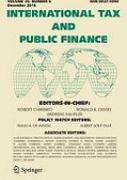Études de cas sur la taxation de l’aide : Bénin, Cameroun et Kenya
21 décembre 2022




Caldeira É, Geourjon AM, Rota-Graziosi G. (2020) Taxing aid: the end of a paradox?, International Tax Public Finance, vol.27, pp.240–255. https://doi.org/10.1007/s10797-019-09573-6

